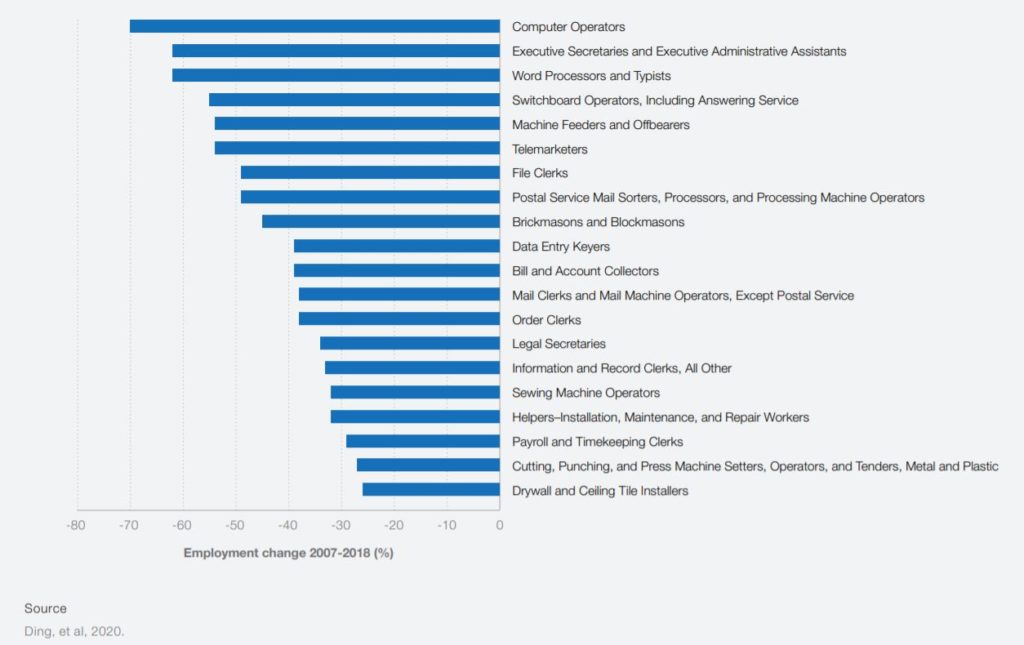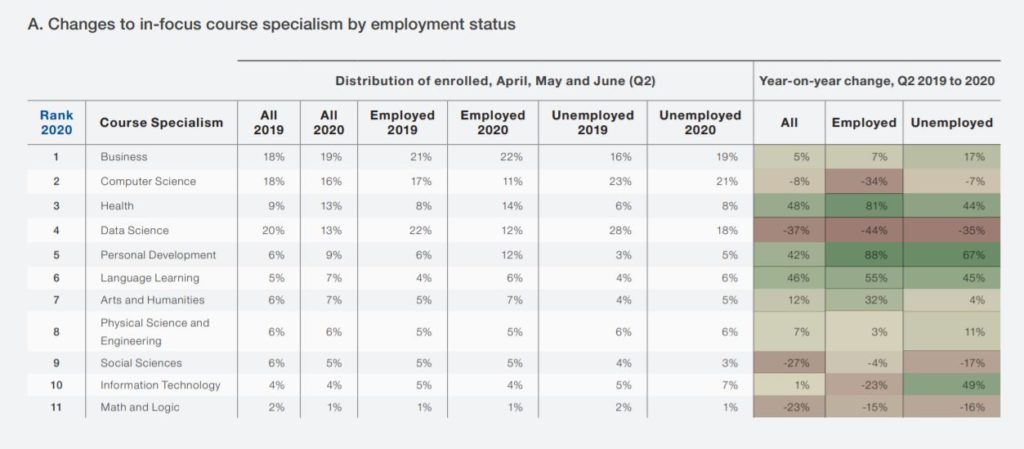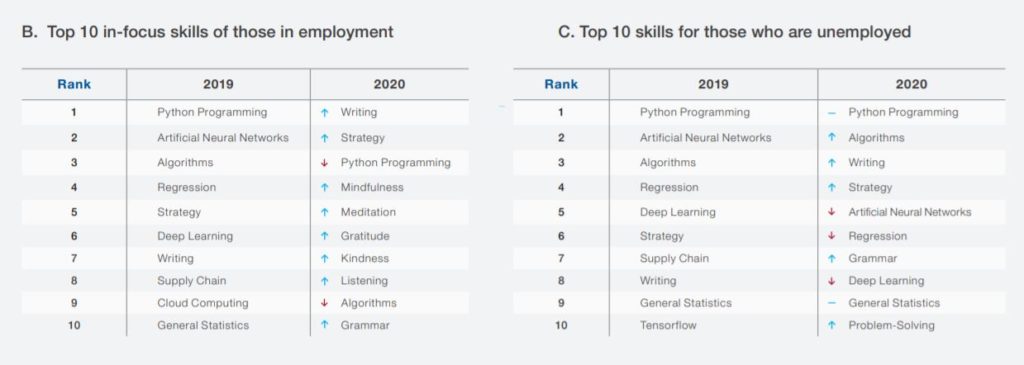The COVID-19 pandemic-induced lockdowns, as well as the resulting worldwide recession in 2020, have cast a cloud over the labour market and hastened the coming of the future of work. This article is based on “The Future of Jobs Report 2020” from the World Economic Forum which includes Jobs that are in growing demand. The combined health and economic shocks of 2020 have sent economies into freefall, disrupted labour markets, and fully revealed the inadequacies of our social contracts, after years of growing income inequality, concerns about technology-driven job displacement, and rising societal discord around the world.
Key Findings
- The rate of technological adoption is projected to continue uninterrupted, and in certain cases may even increase.
- Workers are facing a “double-disruption” scenario as a result of automation and the COVID-19 recession.
- Despite the fact that the number of jobs lost will be outnumbered by the number of ‘jobs of tomorrow’ generated, employment creation is stalling while job destruction accelerates, in contrast to prior years.
- As in-demand skills across jobs evolve over the next five years, skills gaps will continue to widen.
- For the vast majority of the online white-collar workforce, the future of work has already come.
- In the absence of aggressive steps, the simultaneous impact of technology and the pandemic recession is expected to aggravate inequality.
- The popularity of online learning and training is growing, but it appears different for people who are employed.
- In the newly limited labor market, the window of opportunity to reskill and upskill employees has shrunk.
- Despite the current economic slump, the vast majority of employers understand the need of investing in human capital.
Following is the Employment trends for jobs in the United States at high risk of automation, 2007–2018:

Individuals and communities who will be most impacted by COVID-19’s unprecedented changes are likely to be those who are already the most disadvantaged—those who live in areas with poor infrastructure, have limited employment opportunities, and whose income does not provide them with a comfortable living standard, healthcare coverage, or savings. In the absence of ready talent, companies surveyed for the Future of Jobs Survey state that they provide reskilling and upskilling to 62% of their employees on average, and that by 2025, they will expand that provision to another 11%. Employee participation in those courses, however, is low, with only 42% of employees taking advantage of employer-sponsored reskilling and upskilling chances. Different industries have different Jobs that are in growing demand.


Following listed are the Emerging and Redundant job roles for Advanced Manufacturing Industry:
Emerging Job Roles
- Business Development Professionals
- Software and Applications Developers
- Sales Representatives, Wholesale and Manufacturing
- Robotics Engineers
- Internet of Things Specialists
- Data Analysts and Scientists
- Project Managers
- Power Production Plant Operators
- Assembly and Factory Workers
- AI and Machine Learning Specialists
Redundant Job Roles
- Assembly and Factory Workers
- Relationship Managers
- Business Services and Administration Managers
- Sales Representatives, Wholesale and Manufacturing,
- Administrative and Executive Secretaries
- General and Operations Managers
- Door-To-Door Sales Workers, News and Street Vendors
- Data Entry Clerks
- Accounting, Bookkeeping and Payroll Clerks
- Accountants and Auditors
Following listed are the Emerging and Redundant job roles for Consumer Industry:
Emerging Job Roles
- Data Analysts and Scientists
- Big Data Specialists
- AI and Machine Learning Specialists
- Process Automation Specialists
- Food Processing and Related Trades Workers
- Organizational Development Specialists
- Management and Organisation Analysts
- Database and Network Professionals
- Business Development Professionals
- Assembly and Factory Workers
Redundant Job Roles
- Data Entry Clerks
- Administrative and Executive Secretaries
- Accounting, Bookkeeping and Payroll Clerks
- Accountants and Auditors
- Mechanics and Machinery Repairers
- Sales Representatives, Wholesale and Manufacturing
- Material-Recording and Stock-Keeping Clerks
- Door-To-Door Sales Workers, News and Street Vendors
- Client Information and Customer Service Workers
- Assembly and Factory Workers
Following listed are the Emerging and Redundant job roles for Digital Communications and Information Technology Industry:
Emerging Job Roles
- AI and Machine Learning Specialists
- Data Analysts and Scientists
- Big Data Specialists
- Information Security Analysts
- Process Automation Specialists
- Digital Marketing and Strategy Specialists
- Software and Applications Developers
- Digital Transformation Specialists
- FinTech Engineers
- Architects and Surveyors
Redundant Job Roles
- Data Entry Clerks
- Accounting, Bookkeeping and Payroll Clerks
- Administrative and Executive Secretaries
- Client Information and Customer Service Workers
- Accountants and Auditors
- General and Operations Managers
- Electronics and Telecommunications Installers and Repairers
- Architects and Surveyors
- Business Services and Administration Managers
- Financial Analysts
Following listed are the Emerging and Redundant job roles for Education Industry:
Emerging Job Roles
- Vocational Education Teachers
- University and Higher Education Teachers
- Strategic Advisors
- Robotics Engineers
- Management and Organisation Analysts
- Information Security Analysts
- Data Analysts and Scientists
- Business Development Professionals
- Advertising and Public Relations Professionals
- Agricultural Equipment Operators
Redundant Job Roles
- Administrative and Executive Secretaries
- Accounting, Bookkeeping and Payroll Clerks
- Data Entry Clerks
- Statistical, Finance and Insurance Clerks
- Postal Service Clerks
- Business Services and Administration Managers
- Technical Specialists
- Insurance Underwriters
- Building Caretakers and Housekeepers
- Accountants and Auditors
So, these were some Jobs that are in growing demand in various sectors according to World Economic Forum.






